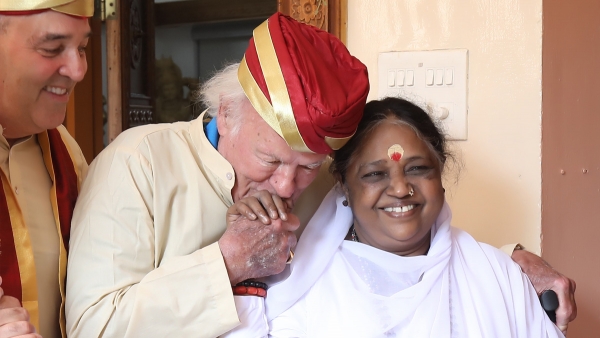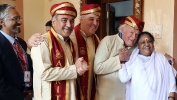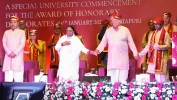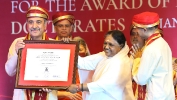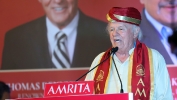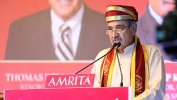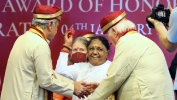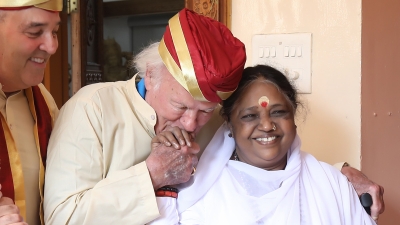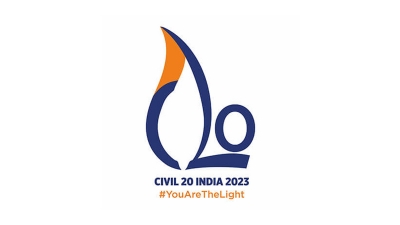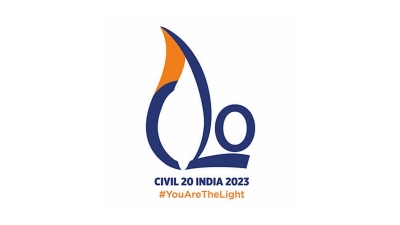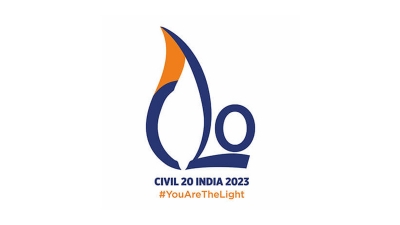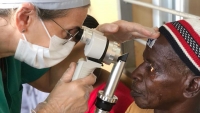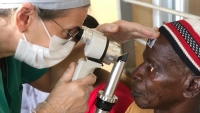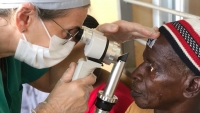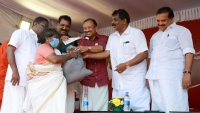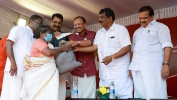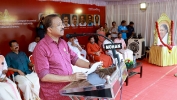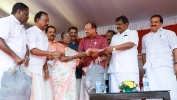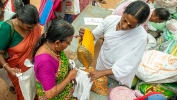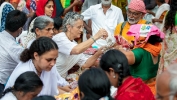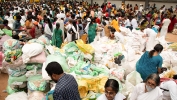El Sr. T. Denny Sanford i el Prof. Pradeep Khosla reben doctorats honoraris d'Amrita Vishwa Vidyapeetham
Com Canceller de Amrita Vishwa Vidyapeetham, Amma va conferir Doctorats Honoris Causa al Sr. T. Denny Sanford, filantrop de renom mundial, i al Prof. Pradeep Khosla, Canceller de la Universitat de Califòrnia, San Diego (UCSD). Amrita va establir aquesta iniciativa de grau superior el 2022 per reconèixer els principals científics, acadèmics i servidors públics del món per les seves contribucions a la humanitat.
El Sr. Sanford es troba entre les persones més riques del món, conegut pel seu desig de "morir a la ruïna" en ajudar les persones necessitades. La seva donació total fins avui és de més de 1600 milions de dòlars, amb els quals ha establert iniciatives benèfiques per a la innovació mèdica, la millora de l'atenció mèdica i la medicina pediàtrica. Això inclou Sanford Health, un grup de 47 hospitals sense ànim de lucre que és el sistema de salut rural més gran dels Estats Units. També és el fundador del Projecte Sanford, que finança esforços per trobar una cura per a la diabetis tipus 1, i és el benefactor de l'Institut de l'empatia i la compassió d'UCSD.
En acceptar l'honor d'aquest doctorat, el Sr. Sanford va dir: “Estic profundament commogut per la feina que estan fent aquí i per formar-ne part amb el nostre programa de compassió on unim les nostres mans, cors i ments. No només el programa que vaig crear per a nens molt petits des de preescolar fins a l'escola intermèdia, que ara arriba a 22 milions de nens als Estats Units, sinó també per treballar en estreta col·laboració amb les institucions de Amma aquí a l'Índia, els Estats Units i a tot el món. Hi ha molta alineació i sinergia entre els meus programes i objectius i la feina de Amma”.
Quan era jove, el Sr. Sanford va desenvolupar una sòlida ètica de treball ajudant als estius a l'empresa de distribució de roba del seu pare. També va ser una vida de reptes primerencs. Quan tenia quatre anys, la mare va morir de càncer de mama i el pare i un germà gran van morir d'una malaltia cardíaca a una edat primerenca. Potser són aquestes experiències les que li van donar la força per seguir endavant i esdevenir un empresari exitós. En formar la seva fundació per a donacions benèfiques el 2001, el seu enfocament inicial va ser ajudar els nens malalts, desafavorits, maltractats i abandonats.
El Sr. Sanford amb expressió de felicitat i gratitud va afegir: “El Sanford Center for Harmony treballarà amb els programes de Amma, com Live-in-Labs, per complementar-se, estendre's i millorar-se mútuament. Sota la guia de Amma, també establirem un Centre d'Empatia i Compassió aquí a Amrita que col·laborarà amb la Universitat de Califòrnia, San Diego, per assolir majors altures i assolir objectius comuns. Estic immensament complagut de tenir l'oportunitat de conèixer Amma i rebre aquest doctorat honoris causa que Amma m'ha atorgat”.
El Prof. Pradeep K. Khosla també va compartir el seu profund agraïment en acceptar l'honor. Nascut a Mumbai, és un distingit líder acadèmic i enginyer elèctric i informàtic que es va convertir en el vuitè canceller d'UCSD el 2012. UCSD és una potència acadèmica i de recerca reconeguda com una de les 15 millors universitats de recerca del món.
El professor Khosla en la seva al·locució va dir: “Amrita té molt en comú amb UC San Diego. Tots dos som multidisciplinaris, centrats en la investigació i els millors classificats. Tots dos tenim un historial demostrat de preparació de ments prometedores per ser líders en qualsevol camí que triïn seguir. Tots dos fomentem un entorn divers, inclusiu i col·laboratiu dins i fora del campus. Tots dos tenim la tradició d'inspirar els estudiants a millorar la condició humana per beneficiar tota la societat”.
El Prof. Khosla encapçala iniciatives impulsades per la tecnologia per fomentar la col·laboració i resoldre els desafiaments socials. Va iniciar el primer Pla Estratègic d'UCSD i va recaptar 3.050 milions de dòlars, superant la meta original en més de 1.000 milions. Amb aquests esforços, ha ampliat significativament l'accés a la universitat i l'assequibilitat de les poblacions marginades ha iniciat investigacions interdisciplinàries i ha enfortit les relacions i les associacions amb la universitat i la comunitat.
“Compartim una dedicació mútua per aprendre més sobre l'empatia i la compassió en el lideratge i per posar en pràctica aquestes lliçons. L'Institut Sanford per a l'Empatia i la Compassió ajuda els professionals mèdics a integrar l'empatia i la compassió en el nucli del tractament del pacient.
“L'institut també s'enfoca a comprendre i donar suport al benestar mental dels proveïdors mèdics, que és tan fonamental per a una atenció de qualitat. L'empatia intenta reconèixer i preocupar-se per com se sent l'altra persona, i cadascú de nosaltres ha de fer aquesta connexió amb els altres per tenir èxit com a líders i col·laborar de manera efectiva”.
Dirigint-se a la reunió, Amma va felicitar els dos llorejats dels doctorats honoraris i va dir: “El cim de la investigació és la compassió, i una vegada l'assoleixes, tota la resta es revela. S'estan fent investigacions en moltes àrees, però una vegada et tornes compassiu, aquesta és la joia de la corona de la vida per al món sencer. Fa que totes les nostres accions siguin dolces i fragants. I després tenir la intenció d'investigar la compassió en si mateixa és significatiu. Hauríem de tenir una profunda estimació pel Sr. Sanford que va emprendre aquest camí, ja que és l'acció d'una gran ment.
“Si la compassió hi és, en qualsevol àrea de recerca, una vegada que aquest sentiment desperti dins de la humanitat, totes les guerres desapareixeran. Si veiem el món a través dels ulls del coneixement i fem el servei amb les mans de la compassió, podrem portar pau i prosperitat a tothom. No hi ha una font de satisfacció tan gran com el servei desinteressat. Totes les negativitats es cremen fins a convertir-se en cendres”.
El professor Venkat Rangan, vicecanceller de Amrita, va explicar com els doctorats honoraris de la universitat representen una confluència de compassió, computació i contemplació. A partir de l'any passat, el propòsit és homenatjar persones d'un impacte benèfic extraordinari per a la societat.
“El Dr. Pradeep Khosla, Rector de la Universitat de Califòrnia, San Diego, representa el millor d'aquesta confluència. Sota el seu lideratge, la Universitat ha esdevingut una de les més buscades a tot el món. Recentment, aquest Canceller de Computació es va trobar cara a cara amb la Canceller de la Compassió, Amma. La compassió va conquistar la computació”, va dir el Dr Rangan
“Com podria una universitat tan enfocada a la ciència, la tecnologia i la medicina establir un institut per a la compassió? És la generositat de Denny Sanford. L'enfocament i la dedicació del Sr. Sanford aviat el van convertir en un empresari exitós al capdavant de gegants corporatius de primer nivell que brinden feina a milers de persones. Això és el que els nostres antics sants anomenen Karma Ioga a la seva màxima expressió.
“L'espurna de la compassió va néixer al seu cor. Va començar a ajudar i alleujar el patiment dels nens, i ara la flama sembla haver-se convertit en una conflagració que culmina en la seva determinació de dedicar tota la seva riquesa, repeteixo, tota la seva riquesa, guanyada amb tant esforç, a aixecar milers de milions de persones a la base de la piràmide.”
El Sr. John A. Pérez, Regent de la Universitat de Califòrnia i expresident de l'Assemblea de l'Estat de Califòrnia, va expressar les seves felicitacions durant les cerimònies. Al llarg de la seva carrera, ha fet de l'assequibilitat i l'accessibilitat a l'educació superior una de les prioritats estatals més importants. En la seva al·locució va dir:
"Estic encantat de poder visitar la Universitat Amrita i l'Hospital Amrita, i em va impressionar particularment la innovació científica, el compromís de brindar atenció mèdica als qui la necessiten i l'enfocament a la compassió i l'amor".
Foto 1: El Sr. T. Denny Sanford va expressar la seva gratitud a Amma per la seva benevolència cap al món.
Foto 2: El Prof. Khosla i el Sr. Sanford van ser reconeguts pel seu treball centrat en l'empatia i la compassió.
Foto 3: La processó a la cerimònia dels doctorats honoris causa.
Foto 4: Oracions per la pau mundial.
Foto 5: Amma atorga el doctorat honoris causa al Sr. Sanford.
Foto 6: Amma atorga el doctorat honoris causa al professor Khosla.
Foto 7: El Sr. Sanford va dir que el títol representa la unió de mans, cors i ments.
Foto 8: El Prof. Khosla va dir que les dues universitats tenen la tradició d'inspirar els estudiants per millorar la condició humana i beneficiar tota la societat.
Foto 9: Amma vessa pètals de flors sobre els dos destinataris.
Foto 10: El Sr. Sanford va agrair a Amma per convertir-se en una mare per a ell i en una Mare del Món.
Mr. T. Denny Sanford and Prof. Pradeep Khosla receive Honorary Doctorates from Amrita Vishwa Vidyapeetham
As Chancellor of Amrita Vishwa Vidyapeetham, Amma conferred Honorary Doctorates on Mr. T. Denny Sanford, world-renowned philanthropist, and Prof. Pradeep Khosla, Chancellor of the University of California, San Diego (UCSD). Amrita established the degree initiative in 2022 to recognize the world’s leading scientists, academics, and public servants for their contributions to humanity.
El Sr. T. Denny Sanford y el Prof. Pradeep Khosla reciben doctorados honorarios de Amrita Vishwa Vidyapeetham
Como Canciller de Amrita Vishwa Vidyapeetham, Amma confirió Doctorados Honoris Causa al Sr. T. Denny Sanford, filántropo de renombre mundial, y al Prof. Pradeep Khosla, Canciller de la Universidad de California, San Diego (UCSD). Amrita estableció esta iniciativa de grado superior en 2022 para reconocer a los principales científicos, académicos y servidores públicos del mundo por sus contribuciones a la humanidad.
Amma llança el logotip del C20 de l'Índia
Amma ha llançat el logotip del grup de compromís civil de l'Índia (C20), que representa la flama de l'esperança, automotivació i servei desinteressat. L'Índia és l'amfitrió oficial d'aquest any de la Cimera G20, una reunió dels líders de la majoria de les economies més grans del món. La Cimera tindrà lloc a Nova Delhi, al setembre.
Amma és la Presidenta del C20, una branca del G20 que funciona com una plataforma per a les organitzacions de la societat civil (OSC) a escala mundial per presentar veus no governamentals i no comercials als líders del G20. Altres membres del comitè inclouen Sri M of the Satsang Foundation com a participant; Sudha Murthy, presidenta de Infosys Foundation com a participant; Rambhau Mhalgi Prabodhini com a secretari; i el Vivekananda Kendra, Kanyakumari com a Soci Institucional.
El lema de C20 és #YouAreTheLight [tu ets la llum], que és una crida a tots els membres de la societat civil perquè s'uneixin, estableixin els seus propis camins, trobin solucions i resolguin problemes a través de l'esforç col·lectiu. En inaugurar el logo, Amma va dir:
“Amma s'inclina davant de tots, encarnacions de l'Amor pur i de l'Ésser Suprem. En aquesta ocasió amb motiu del llançament del logo C20, Amma resa perquè aquest eminent afany aporti transformació en la ment humana.
“Que les nostres accions parlin més que les nostres paraules. Que puguin crear ones damor, compassió i respecte en els cors humans. Com al logo, que els llums il·luminin els nostres cors. Que il·luminin el món i tots els éssers sensibles i insensibles que hi ha. Amma les ofereix a tots els éssers en el Suprem”.
Atès que el Govern de l'Índia ha establert la seva agenda del G20 com a "Una Terra, Una Família, Un Futur", hi ha un gran potencial per unir esforços com a éssers humans nobles i buscar solucions als desafiaments que afronta el món en aquest moment crític .
Les OSC representen una àmplia gamma de temes, inclosa l'Agenda 2030 de l'ONU i els Objectius de Desenvolupament Sostenible, i com a tals són una de les eines més poderoses que tenen les societats per arribar a un ampli espectre d'opinions, perspectives i experiències. Abans de la Cimera del G20, C20 col·laborarà amb centenars d'OSC [Organitzacions Socials i Civils] de tot el món.
Amma launches India’s logo for Civil 20
Representing the flames of hope, self-motivation, and selfless service, Amma launched the logo for India’s Civil 20 engagement group (C20). India is this year’s official host for the G20 Summit, a gathering of the leaders of most of the world’s largest economies. The Summit will take place in New Delhi in September.
Amma is the Chair of C20, a branch of G20 that functions as a platform for civil society organisations (CSOs) on a global scale to bring forth non-government and non-business voices to the G20 leaders. Other committee members include Sri M of the Satsang Foundation as a Participant; Sudha Murthy, Chair, Infosys Foundation as a Participant; Rambhau Mhalgi Prabodhini as Secretariat; and the Vivekananda Kendra, Kanyakumari as Institutional Partner.
Amma lanza el logotipo del C20 de la India
Amma ha lanzado el logotipo del grupo de compromiso civil de la India (C20), que representa la llama de la esperanza, la automotivación y el servicio desinteresado. India es el anfitrión oficial de este año de la Cumbre G20, una reunión de los líderes de la mayoría de las economías más grandes del mundo. La Cumbre tendrá lugar en Nueva Delhi, en septiembre.
Cirurgies de cataractes realitzades a Serra Lleona
El nostre projecte a Àfrica amb Visió Sense Fronteres, Espanya, es va associar amb Don Bosco Fambul a Serra Lleona per realitzar 134 cirurgies de cataractes. El campament mèdic de 10 dies es va dur a terme al petit hospital de Don Bosco Fambul a Freetown, on també es van realitzar procediments dentals.
Els voluntaris de Visió Sense Fronteres van començar amb dos optometristes que van visitar els pobles del voltant per arribar a les persones que necessitaven atenció oftalmològica i visual. Es va recolzar els pacients amb cataractes perquè poguessin acudir a l'hospital per ser operats.
Cataract surgeries performed in Sierra Leone
Our project in Africa with Visio Sense Fronteres, Spain partnered with Don Bosco Fambul in Sierra Leone to carry out 134 cataract surgeries. The 10-day outreach and medical camp took place at Don Bosco Fambul's small hospital in Freetown where dental procedures were also performed.
The Visio Sense Fronteres volunteers started with two optometrists visiting villages in the surrounding area to reach out to people in need of eye and vision care. Patients with cataracts were supported to come to the hospital for surgery.
Cirugías de cataratas realizadas en Sierra Leona
Nuestro proyecto en África con Visio Sense Fronteres, España, se asoció con Don Bosco Fambul en Sierra Leona para realizar 134 cirugías de cataratas. El campamento médico de 10 días se llevó a cabo en el pequeño hospital de Don Bosco Fambul en Freetown, donde también se realizaron procedimientos dentales.
Los voluntarios de Visio Sense Fronteres comenzaron con dos optometristas que visitaron los pueblos de alrededor para llegar a las personas que necesitaban atención oftalmológica y visual. Se apoyó a los pacientes con cataratas para que pudieran acudir al hospital para ser operados.
15.000 dones d'AmritaSREE SHG reben suport a la capital de Kerala
S'ha celebrat el llançament del programa d'aquest any per arribar a més de 200.000 dones que pertanyen a més de 13.000 grups d'autoajuda a l'Índia.
Thiruvananthapuram, Kerala - 27 de desembre de 2022
Amrita Self-Reliance Education and Employment (AmritaSREE) [Autosuficiència, Educació i Ocupació Amrita] va celebrar l'inici de la campanya per al proper any a Thiruvananthapuram, Kerala. Hi van assistir unes 15.000 dones que pertanyen als Grups d'Autoajuda (SHG) de AmritaSREE al districte. Van rebre lots d'ajuda que inclouen ajut econòmic, aliments i roba nova per als membres de la família.
"L'esquema AmritaSREE està en línia amb la visió del primer ministre Narendra Modi que els ciutadans del nostre país es tornin autosuficients, i així es transmet un missatge que va més enllà de proporcionar mitjans de subsistència als pobres. En el 75 ° Dia de la Independència, el primer ministre Narendra Modi va dir que l'Índia s'ha de convertir en un país desenvolupat els propers 25 anys, i el projecte AmritaSREE és un model que va encaminat en aquesta direcció”, va dir el Ministre d'Estat d'Afers Exteriors de l'Índia, V Muraleedharan, en el discurs inaugural.
AmritaSREE dóna suport als seus membres, majoritàriament dones d'àrees rurals i aïllades, per guanyar-se la vida de manera independent a través de professions que no depenen de patrons climàtics cada cop més impredictibles, especialment la pesca i l'agricultura.
El Sr. Muraleedharan va dir que l'èxit d'AmritaSREE es pot entendre pel fet que els membres dels SHG obtenen ingressos d'empreses autosuficients a 54 tipus d'indústries productives, que van des de la capacitació digital fins a la fontaneria i la producció de refrigeris.
“No és només responsabilitat del govern buscar un estatus millor de país. És una cosa en què tots han de participar col·lectivament. El projecte de Amma, que ha estat dirigint durant els darrers 17 anys, atén actualment més de 200.000 dones. Tant de bo això s'estengui al desenvolupament de tot el país”, va afegir.
Mata Amritanandamayi Math (MAM) va iniciar AmritaSREE després del tsunami de l'Oceà Índic quan les famílies de pescadors de l'estat de Kerala es van quedar completament devastades. Ara hi ha més de 13.000 grups d'autoajuda SHG a Kerala, Tamil Nadu, Karnataka i Maharashtra. Ara que aquest projecte entra al seu any 18, es celebraran reunions similars en què participin tots els seus membres.
"AmritaSREE és un projecte que ha tingut un impacte positiu a la vida de les persones. No és un esquema que brindi únicament assistència econòmica o un lot d'aliments, sinó que és un programa que brinda alleujament a milers i milers de famílies de Kerala. Estableix seguretat. La benvolença de Amma arriba a tot arreu, i l'Ashram pot veure les persones com a éssers humans sense importar la seva casta ni la seva religió", va dir el Sr. Antony. Raju, ministre de Transports de Kerala, mentre pronunciava el discurs d'obertura.
Durant l'esdeveniment, el membre del Parlament de l'Índia, Adoor Prakash, que va presidir aquesta trobada, va afegir: "Les activitats de l'Ashram són un raig d'esperança per a la societat i els projectes que executa canvien la vida de les persones".
Una dona de la Unitat Chirayankeezhu va manifestar: “La distribució de lots d'aliments i roba en aquesta situació econòmicament desavantatjosa és molt útil per a tots nosaltres. Els membres desafavorits del nostre grup SHG ho consideren un gran suport”.
Més enllà de l'ajuda econòmica, AmritaSREE ha esdevingut una força vital per la potenciaació de les dones. Els membres dels grups SHG creen empreses comercials i desenvolupen professions innovadores. AmritaSREE ofereix capacitació vocacional i habilitats, així com aliments, roba i altres subministraments bàsics per a les famílies. Moltes d'aquestes dones, que alguna vegada van ser vulnerables a la pobresa, es tornen independents.
“És un alleugeriment rebre això. Aquesta és una mà amiga per a aquells que estan lluitant a casa. Reunir-nos setmanalment i tenir l'opció d'obtenir un préstec de SHG és un gran suport per satisfer les nostres necessitats essencials. Avui, el valor d'aquest lot encara és més gran, ja que és un regal de Amma”, va explicar un altre membre d'AmritaSREE.
Els programes per a l'aniversari d'AmritaSREE s'estan organitzant a molts districtes per garantir la participació de personalitats eminents dels camps social, espiritual, cultural i polític de les seves comunitats. D'aquesta manera, la iniciativa podrà arribar a més i més dones per brindar-los el suport necessari per formar nous grups d'autoajuda.
A l'esdeveniment de la capital de Kerala també van participar el Sr. R Ranganathan, coordinador d'AmritaSREE, per presentar l'acte; Swami Turiyamritananda Puri que va compartir el discurs de benedicció. També un membre del Comitè Central del BJP, PK Krishnades; el president del districte Panchayat, Adv. D Suresh Kumar; i el regidor del districte, G Madhavadas, els qui van fer entrega de felicitacions. El director d'Amrita Vidyalaya, GS Sajikumar, també hi va ser present.
Cada any, l'Ashram proporciona una subvenció inicial de 30.000 rupies als grups SHG amb 20 membres. També es distribueixen més de 500.000 saris a dones d'AmritaSREE, juntament amb roba nova per a les famílies.
Video: Els que van assistir a l'acte, des de polítics fins a membres de SHG, consideren que l'inici de AmritaSREE aquest any representa un nou capítol a la vida de moltes persones.
Foto 1: Les dones que pertanyen als SHG de AmritaSREE al districte de Thiruvananthapuram van rebre lots d'ajuda econòmica, aliments i roba per a elles i les seves famílies.
Foto 2: El ministre d'Estat d'Afers Estrangers de l'Índia, Sri V Muraleedharan, va dir que el model d'autosuficiència de AmritaSREE és un exemple per a tot el país.
Foto 3: AmritaSREE va ser iniciada pel Math el 2005 després del tsunami de l'Oceà Índic quan les famílies de pescadors necessitaven trobar una nova manera de guanyar-se la vida.
Foto 4: Avui dia, hi ha més de 13.000 SHG de AmritaSREE a Kerala, Tamil Nadu, Karnataka i Maharashtra que donen suport a les famílies de més de 200.000 dones.
Foto 5: La majoria de dones que pertanyen als SHG diuen que el suport les ha ajudat a superar moments molt difícils per a elles i les seves famílies.
Foto 6: Per a molts membres, l’experiència de la no dependència és un factor revolucionari en els seus contextos familiars.
Foto 7: AmritaSREE està ampliant els seus esforços per arribar a més i més dones i brindar-los el suport necessari per formar grups SHG.Más...
15,000 women with AmritaSREE SHGs receive support at Kerala’s Capital
The event was the launch of this year’s initiative to reach more than 200,000 women who belong to the 13,000+ self-help groups in India.
Thiruvananthapuram, Kerala - November 27, 2022
Amrita Self-Reliance Education and Employment (AmritaSREE) held its inauguration for the coming year in Thiruvananthapuram, Kerala. About 15,000 women who belong to AmritaSREE Self-Help Groups (SHGs) in the district attended. They received aid packages that included financial aid, food supplies, and new clothing for family members.
15.000 mujeres de AmritaSREE SHG reciben apoyo en la capital de Kerala
Se ha celebrado el lanzamiento del programa de este año para llegar a más de 200 000 mujeres que pertenecen a más de 13 000 grupos de autoayuda en la India.
Thiruvananthapuram, Kerala - 27 de noviembre de 2022
Amrita Self-Reliance Education and Employment (AmritaSREE) [Autosuficiencia, Educación y Empleo Amrita] celebró el inicio de la campaña para el próximo año en Thiruvananthapuram, Kerala. Asistieron unas 15.000 mujeres que pertenecen a los Grupos de Autoayuda (SHG) de AmritaSREE en el distrito. Recibieron lotes de ayuda que incluían ayuda económica, alimentos y ropa nueva para los miembros de la familia.
Maha Shivaratri - Puja & Homa @Amritapuri
Maha Shivaratri
Puja & Homa @Amritapuri
Sábado 18 de Febrero 2023
Dos Pujas/Homas en diferentes momentos serán retransmitidas en directo desde Amritapuri.
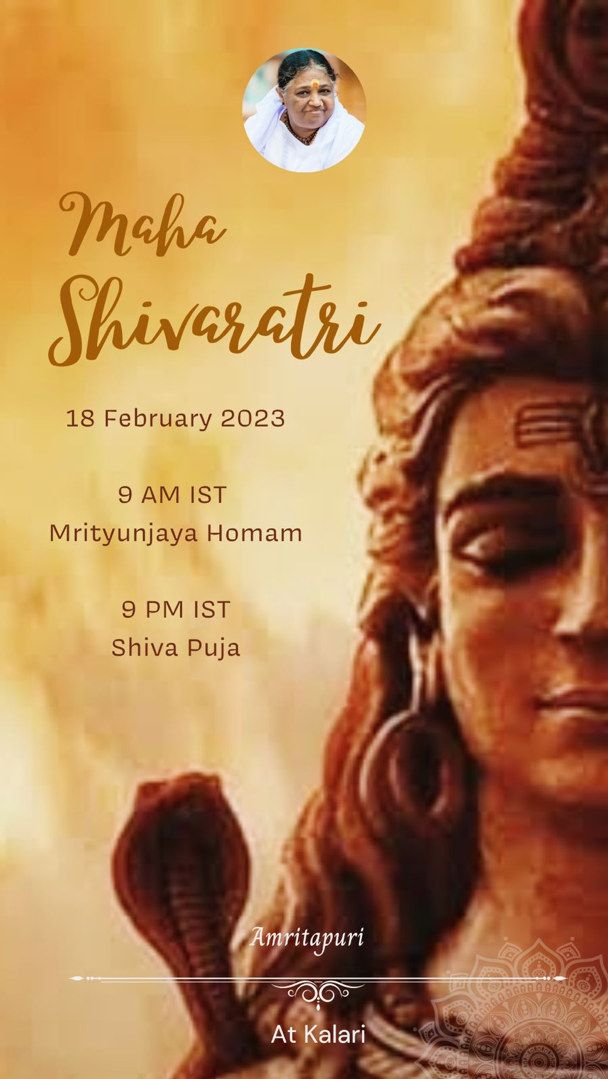 |
Tus Opciones: |
|
Mrityunjaya Homa https://static.amritapuja.org/special_pujas/shivaratri/2023/shivaratri_sp.html |
|
|
Maha Mrityunjaya Homa Shiva Puja Regístrate aquí: |
|
|
Fecha y hora límite: |
|
IST – Indian Standard Time |
CET – Central European Time |
Amma dice: "Hijos, hagáis lo que hagáis, debéis pensar siempre en Dios. Este es el propósito de los rituales. Los rituales fomentarán buenos hábitos y pondrán orden en la vida. Cada ritual fue creado como una ayuda para mantener un recuerdo ininterrumpido de Dios.”
Durante la Puja y la Homa, la atmósfera se purifica a través del canto devocional de Bhajans, oraciones intensas y recitación de mantras como Sri Rudram, Chamakam, MahaMrityunjaya Mantra, etc.
Nuestro campo energético y nuestro cuerpo se benefician de ello, lo que nos permite tocar más fácilmente nuestra divinidad interior, nuestra verdadera naturaleza.
Las Pujas y las Homas realizadas desinteresadamente ayudan a restaurar la armonía en la Naturaleza y contribuyen al bienestar de la sociedad.
Todas las pujas, servicios de astrología y cualquier coordinación adicional de pujas son realizadas por discípulos y voluntarios como servicio desinteresado; no reciben ningún salario. Los fondos recibidos por las pujas apoyan directamente las actividades benéficas de Embracing the World. Para más información, visita www.embracingtheworld.org
- Se le pedirá que facilite la siguiente información:
- Nombre, apellidos
- Estrella de nacimiento (en Jyotish - Astrología Védica llamada Nakshatra)
- Si se desconoce: fecha de nacimiento, lugar y país de nacimiento, hora de nacimiento.
- Dirección de correo electrónico a la que se enviará el enlace
- Nombre y dirección postal donde enviar el Prasad
Acerca del festival Shivaratri:
Con motivo de Shivaratri, las prácticas espirituales nos ayudan a despertar a nuestro Verdadero Ser.
En la India hay dos tipos de festivales: los de regocijo y los de austeridad. Shivaratri suele considerarse una noche en la que se renuncia a la comida y al sueño para dedicar tiempo al recuerdo de lo divino.
Extractos del Mensaje de Shivaratri 2022 de Amma
https://www.amma-spain.org/en/mostrar/item/1634-siva-es-mi-verdadera-naturaleza
IIndia es tierra de innumerables festivales y celebraciones religiosas. Estos festivales y celebraciones apoyan la vida social de la gente y aumentan su fe y sus valores éticos. Entre los festivales del Sanatana Dharma, uno de los más importantes es Shivaratri.
El verdadero Shivaratri significa despertar al principio que hay detrás del festival.
¿Qué es el Shiva-tattvam, el principio que hay detrás del Señor Shiva? Es la comprensión de que "Shiva es mi propia naturaleza". Es el reconocimiento de que "Yo soy esa conciencia pura". Es mirar hacia dentro y darse cuenta de la verdadera naturaleza de nuestro propio ser. Este es el mensaje de Shivaratri
Om Namah Shivaya
 |
VUELVEN LOS MERCADOS DE REVIVE REUSA RECICLA AL AIRE LIBRE
Mercat d'antiguitats i segona mà de la Girada
Domingo 5 de Marzo de 10:00 a 14:00
Próxima cita:
Domingo 5 de Marzo de 10:00 a 14:00
Mercat d'antiguitats i segona mà de la Girada
Rambla de la Girada (Vilafranca del Penedès)
Ven a vernos y podrás colaborar con Embracing the World llevándote a casa algún artículo de tu interés dándole una segunda vida o participando de este seva. ¡Ven o contacta y te informaremos!
Más Información: 682 15 71 71 (Praseeda) / 622 12 90 91 (Jaganmay) / Esta dirección de correo electrónico está siendo protegida contra los robots de spam. Necesita tener JavaScript habilitado para poder verlo.
MERCADOS DE REVIVE REUSA RECICLA AL AIRE LIBRE
Una forma más de servir a Amma.
- Dando a conocer a AMMA
- Favoreciendo la Obra Humanitaria ETW
- Siguiendo el concepto de Coste cero
- Dando una 2ª oportunidad a multitud de Objetos
- Despertando Amor a través del Voluntariado
¡PARTICIPA!
Más Información: 682 15 71 71 (Praseeda) / 622 12 90 91 (Jaganmay) / Esta dirección de correo electrónico está siendo protegida contra los robots de spam. Necesita tener JavaScript habilitado para poder verlo.
Centro Amma (Piera) www.amma-spain.org
OM NAMAH SHIVAYA



